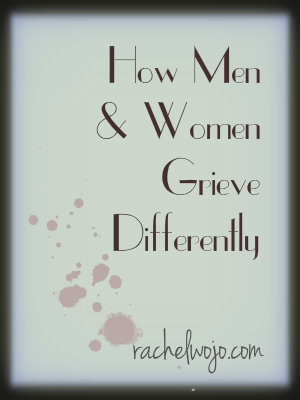How Men And Women Grieve Differently- A Guest Post
Disclosure: This post may contain affiliate links, meaning if you decide to make a purchase through my links, I may earn a commission at no additional cost to you. See my disclosure for more info.
My friend, Erica McNeal, is our special guest today; she is the author of Good Grief!: How to Create an Oasis When Life is A Desert. What an incredible journey the Lord has given Erica in this world! If there is anyone who understands Hope for Hurting Hearts, she is one. Today she brings us a post to help us understand how men and women grieve differently.
In our first seven years of marriage, my husband Todd and I have experienced more tragedy than most marriages will ever endure. My cancer which had gone into remission before we were married relapsed twice, the first time just five months after our wedding. During this seven years, we also experienced the heartache of grieving the death or loss of five children.
We never would have anticipated when we said, ‘I do!” that we would one day bury our baby girl, endure two miscarriages, and give back a child to his mom after she decided to revoke his adoption plan.
Someone once asked me how it is possible that Todd and I have endured so much, yet, our marriage is not only intact, but thriving? While the only reason I can truly give is by the grace of God, we have also accepted that men and women grieve very differently, and we have chosen not to hold those differences against the other person. No grief process will ever be the same, even if the loss happens to the same couple.
The reality is God made us uniquely different to handle the process of grief, as individuals and as a couple. This gives us the ability to compliment and support each other through tragedy. Todd and I recognized that we had a choice to make. We could either fight this God-given design (and each other), or we could communicate and use these differences to our advantage.
Men:
Have a fix it nature – “How can I fix this?” or “What can I do?”
Wanting to be the strong, dependable, keep-it-together husband.
Feelings of “I have to do better – I am the husband.”
Will tend to compartmentalize grief.
May throw himself into work to fill the need of wanting to control something.
Work may become his safe haven because home feels (is) so out of control.
Appear emotion-less, even though they are likely filled with emotions.
Will not likely want to talk about what they are feeling.
Men tend to want to think through their grief and rationalize the process.
Women:
After the initial shock, women tend to put their head down and deal with their grief right away and slowly work on getting better.
Emotions spill over and she may not know why she is crying.
Accepting the new her: the most difficult question for a bereaved mama to answer is, “How many children do you have?”
May get to a point where she stops caring. It doesn’t matter if the laundry, dinner, life, dishes, house-work get done, or bills get paid. Little is important anymore because women may not know how to function in her new identity.
Women want to feel through their grief.
She wants to talk about her feelings and emotions.
Will likely be the first to say something really stupid because she uses talking out loud to help sort her emotions.
Afraid to laugh or be happy again.
Both:
Afraid to hurt each others feelings.
Concerned about how each other is grieving.
Grief tends to compound if not dealt with.
We will all deal with grief at some point in our lives and no marriage will be able to escape it.
However, instead of fighting the way your spouse is processing their grief, learn from, and about him or her. As Todd and I worked together to support how we each needed to grieve individually, and as a couple, we grew closer and stronger.
If your marriage is going through a grieving process, ask questions and create conversations with each other. Approach the way your spouse is grieving and their current needs, not as right or wrong, but perhaps very different from your own journey and what you might need right now.

Do you have any questions or comments for Erica? We would love to read them below!


